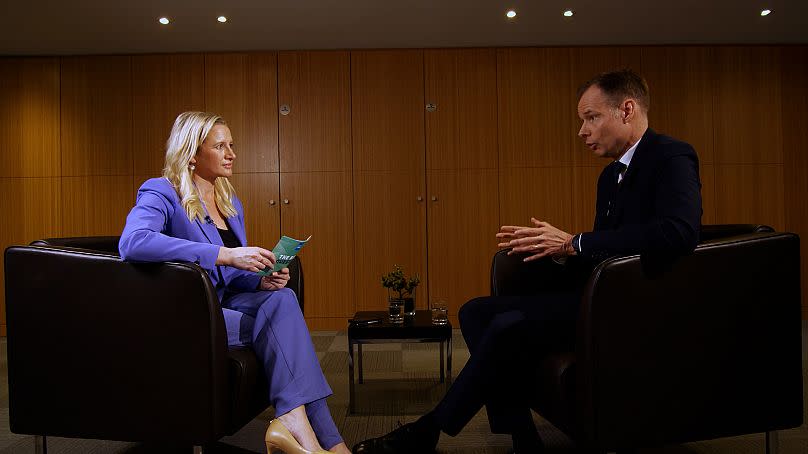‘Don’t make it a hassle to invest in Europe’: Why has the EU fallen behind its competitors?
There are 44 countries in Europe and across all of them there’s an estimated 32 million active enterprises, according to 2022 data from the European Commission.
However, growth has been pretty bleak in the past few years. The European Central Bank (ECB) estimated growth in 2023 to be 0.6%, and is only projecting a marginal improvement of 0.8% in 2024.
To put that in context, in the USA GDP increased at an annual rate of 3.3% in the fourth quarter of 2023 and both Reuters and the World Bank have put China’s 2023 growth at 5.2%.
So what is Europe doing wrong?
In this episode of The Big Question, Angela Barnes sits down with Fredrik Persson, president of Business Europe, to discuss how to make Europe a competitive place to do business again.
Energy is the key to getting Europe back on track
Business Europe represents 36 of Europe’s national business federations - all 27 of the EU member states, plus a few more including the UK and Ukraine.
When asking their members what they think is causing a lack of growth and hampering competitiveness, three key topics are brought up: energy, regulation and openness of trade.
“The cost of energy - that for sure is related to, first, the pandemic but foremost, the war in Ukraine, which has put Europe at a disadvantage.
“A year ago we had even higher prices and they have now come down. But even at the current levels, post-pandemic prices are twice in Europe, as we saw before.
“If you go to the US, they're about 30%. So we're losing out against our US competitors and our Asian competitors,” explains Fredrik.
Without resolving the cost of energy, Fredrik says we will continue to see businesses, like BASF, the world’s largest chemical producer, move out of Europe for more favourable pricing.
“They have their state of the art factory in Ludwigshafen. Now they are deciding to invest €10 billion in China [even] with the political risk challenges there are with China [and] with the distance.”
Spain's economy is thriving: Why it's growing more than its EU rivals
Renewables could make Europe's small and medium businesses crisis-proof
Why is it important to support SMEs?
New Eurostat data shows that small and medium-sized enterprises (SMEs) make up over 99% of EU companies.
And this is where Fredrik stresses that it’s really important for Europe to get its regulation right.
“We're so keen in Europe to regulate things.
“As an example, in the last five years we have had close to 100 new laws being passed on European level, and that is adding 5,000 pages of new regulatory text to the companies. It basically means that currently you're getting a new regulation every second day.
“For a big company, this is a hassle but they have the structure, they have the departments to handle it.
“But if you're an SME - what happens with them? They either go out of business, they decide not to enter a new market, and they are the backbone of the large caps (a company with a market capitalisation value of more than $10 billion) because if you don't have the SMEs, the large caps will falter as well.”
That’s not to say Fredrik and his team at Business Europe want to throw all regulation out of the window. Their hope is for less but better regulation, including faster processing times and more opportunities to do business outside of the EU.
“If we do that, I'm positive, then Europe will get back in the number one position,” Fredrik says.

What are Europe’s business strengths and weaknesses?
Fredrik stated that without change, the outlook for Europe is bleak. He praised how the US has stormed ahead within the tech sector but noted the strength of Europe’s green tech sector.
“If you look back over the last 15 years, one reason behind the sort of stellar growth in the US versus Europe is, of course, the way they've moved within tech.
“So where do they see that they have weakness? I mean, when you look at the IRA, (Inflation Reduction Act) obviously they've made the comparative study and said ‘we're falling behind on green technology. We're falling behind Europe.’
“That is the best acid test of ‘where is Europe performing really well?,” he added.
The Big Question is a series from Euronews Business where we sit down with industry leaders and experts to discuss some of the most important topics on today’s agenda.
Watch the video above for the full conversation with Business Europe.

 Yahoo Finance
Yahoo Finance 